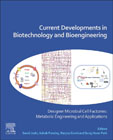
Current Developments in Biotechnology and Bioengineering: Designer Microbial Cell Factories: Metabolic Engineering and Applications
Joshi, Swati
Pandey, Ashok
Sirohi, Ranjna
Park, Sung Hoon
Designer Microbial Cell Factories: Metabolic Engineering and Applications, the latest release in the Current Developments in Biotechnology and Bioengineering series, provides a detailed overview of the biotechnological approaches and strategies used to generate engineered microbes and to facilitate the acceleration, modulation and diversion of metabolic pathways to get desired output such as production of value-added compound or biodegradation of xenobiotic pollutant. The book also highlights applied aspects of designer microbes in fields as diverse as agriculture, pharmaceuticals and bioremediation. Designer microbes generated through reprogramming the microbial cell factories (MCFs) provide an edge over their natural counterparts in terms of increased molecular diversity and selective chemistry. These bugs are becoming instrumental in several areas, including agriculture, environment and human health. Engineering microbes through directed evolution not only gives freedom from evolutionary constrains but also allow introduction of regulated and foreseeable functions into MCFs. Dedicated to the designing of microbes, covering state-of-the-art technological advancements in the field Includes applications of metabolic engineering in the field of agriculture, bioremediation, value-added products, therapeutics, and more Contains chapters dedicated to innovative approaches surrounding engineered microbial consortia Provides comprehensive details and helps users understand concepts INDICE: Section I: Technical Aspects of Metabolic Engineering 1. Metabolic engineering: Raw materials, rewiring of pathways and creation of value 2. Development and applications of synthetic biology tools for engineering microbial cell factories 3. Membrane transport as target for metabolic engineering 4. Metabolic flux analysis and modelling tools 5. Equipped C1 chemical assimilation pathway in heterotrophic microbes 6. Adaptive evolution for microbial cell factory 7. DNA assembly and proteomics for metabolic engineering 8. Approaches and tools to tailor proteins for metabolic engineering 9. Microbial consortium engineering Section II: Translational Aspects of Metabolic Engineering 10. Metabolic engineering strategies for effective utilization of sugars to produce value-added products 11. Production of fine chemicals from renewable feedstocks through the engineering of artificial enzyme cascades 12. Designer bacteria for drug discovery 13. Engineered microbes for the production of flavnoids 14. Engineered microbes for the production of organic acids 15. Engineered microbes for advanced biofuel production 16. Engineered microbes for the production of biobutanol 17. Engineered microbes for bioremediation 18. Engineered microbes for agricultural applications 19. Metabolic engineering strategies for effective utilization of sugars to produce value-added products 20. Production of fine chemicals from renewable feedstocks through the engineering of artificial enzyme cascades 21. Designer bacteria for drug discovery 22. Engineered microbes for the production of flavnoids 23. Engineered microbes for the production of organic acids 24. Engineered microbes for advanced biofuel production 25. Engineered microbes for the production of biobutanol 26. Engineered microbes for bioremediation 27. Engineered microbes for agricultural applications 28. Rhizosphere microbiome engineering 29. Engineered microbes for the recovery of metals from contaminated sites 30. Synthetic Biology and regulatory roadmap for the commercialization of designer microbes
- ISBN: 978-0-323-88504-1
- Editorial: Elsevier
- Encuadernacion: Rústica
- Páginas: 362
- Fecha Publicación: 01/07/2022
- Nº Volúmenes: 1
- Idioma: Inglés
